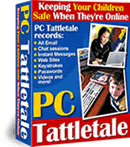Online safety starts with communication between children and parents, it is also important for parents to understand some online terminology. Here are four ways to help keep your child safe inline.
Online safety begins with conversation. Parents need to have open an honest conversations with thier children about some of the dangers, and be willing to answer questions their child may have. It is also important for parents the benefits and dangers and to have an understanding what their kids are doing online. The Internet can be a safe place, and a place for your child to gain invaluable knowlege and exposure to the rest of the world, but care must be taken, and as you would talk to your child about not talking to strangers, so must you talk to your child about how to stay safe online. Here are some tips by Michelle,freelance writer and Mother. kevin
Four Ways To Kee Your Child Safe Online
by Michelle Donaghey
1) Know your Instant Message and Chatroom abbreviations!by Michelle Donaghey
Most parents don’t know what those capital letter and number abbreviations kids are using when they are [tag-ice]online chat[/tag-ice] with their friends. Do you know that A/S/L? means age, sex, location? Do you also know that 143 means “I Love You” or that anything starting with a “P” can reference parents. PA is “parent alert”, PAW is “parents are watching”, PANB means “parents are nearby”, and POS is “parent over shoulder.” In fact ninety-five percent of parents can’t “identify common chat room lingo that teenagers use to warn people they’re chatting with that their parents are watching.” according to Ketchum Global Research Network, Parents’ Internet Monitoring Study(National Center for Missing & Exploited Children and Cox Communications, 2005).
Learning chat abbreviations can help you to monitor your child and can also open communication concerning chat and chat rooms. A good website to visit to get a list of chat abbreviations is at MissingKids.com.
2) Have an agreement!
Parents should also have their child sign an Agreement To Abide by the Rules and post the agreement and the rules near the computer. The National Center for Missing and Exploited Children (1997) offers the following as appropriate rules:
- I will not give out personal information such as my address, telephone number, parent’s work address/telephone number, or the name of my school without my parent’s permission.
-
I will tell my parents right away if I come across any information that makes me feel uncomfortable.
-
I will never agree to get together with someone I "meet" online without first checking with my parents. If my parents agree to the meeting, I will be sure that it is in a public place and bring my mother or father along.
-
I will never send a person my picture or anything else without first checking with my parents.
3) Educate! Make sure your child understands even at a young age!
While you may not think it is that important that you educate your child on the dangers on the internet, you should actually start teaching them before they enter kindergarten when they know that they have special and private parts of their body. You should explain to them that not only touching but exposing and talking about these parts is special and private.
Be sure to teach them not to give out any personal information!. Often especially younger children think that their address, telephone numbers and their parent’s names and other information is worth repeating as it often gets them positive attention. Explain to them that they can give it friends at school, police officers if they are lost, or paramedics if they are hurt but NEVER to give their full name, telephone number, name of school or address on the [tag-self]internet[/tag-self]! . Explain to them that people who say they are good on the internet may not be good people in real life.
[tag-tec]Children[/tag-tec] should also be told to not open email messages without a parent present (unless it is from a trusted family member!) and to always tell their parents if they see anything that makes them feel uncomfortable online.
4) Give positive attention and feedback!
No matter what age your child is, make sure that they get plenty of positive attention at home. Talk to them and take time out to actually listen! Often children who become victims are those who feel isolated, lonely, and unworthy. By spending time with them you will get to know your child and their inner feelings.
Biography
Michelle Donaghey is a freelance writer and mother of two boys, Chris and Patrick, who are her inspiration. She lives in Bremen, Indiana just south of South Bend, home of Notre Dame. When she isn’t writing, Michelle can be found in her perennial flower garden or working on small home improvement projects. She has written for parenting publications including Metro Kids, Atlanta Parent,Dallas Child, Great Lakes Family, Family Times and Space Coast Parent and websites including iparenting.com.
No part of this article may be copied or reproduced in any form without the express permission of More4Kids Inc © 2006

"Without Internet Monitoring Software & Parental Control Software, You’ll Never Know What They Do Online!"
Posting Tags: [tag-self]Internet Safety[/tag-self]










Add Comment